《法律经济学》课程PPT教学课件(法律的经济分析)经济学与法律的对话(大卫·弗里德曼)L&E 3 14 Property
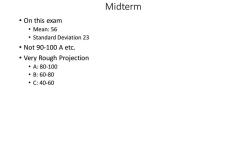
Midterm ·On this exam ·Mean:56 Standard Deviation 23 ·Not90-100Aetc. Very Rough Projection ·A:80-100 ·B:60-80 ·C:40-60
Midterm • On this exam • Mean: 56 • Standard Deviation 23 • Not 90-100 A etc. • Very Rough Projection • A: 80-100 • B: 60-80 • C: 40-60
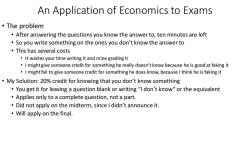
An Application of Economics to Exams 。The problem After answering the questions you know the answer to,ten minutes are left So you write something on the ones you don't know the answer to This has several costs It wastes your time writing it and mine grading it I might give someone credit for something he really doesn't know because he is good at faking it I might fail to give someone credit for something he does know,because I think he is faking it My Solution:20%credit for knowing that you don't know something You get it for leaving a question blank or writing "I don't know"or the equivalent Applies only to a complete question,not a part. Did not apply on the midterm,since I didn't announce it. Will apply on the final
An Application of Economics to Exams • The problem • After answering the questions you know the answer to, ten minutes are left • So you write something on the ones you don’t know the answer to • This has several costs • It wastes your time writing it and mine grading it • I might give someone credit for something he really doesn’t know because he is good at faking it • I might fail to give someone credit for something he does know, because I think he is faking it • My Solution: 20% credit for knowing that you don’t know something • You get it for leaving a question blank or writing “I don’t know” or the equivalent • Applies only to a complete question, not a part. • Did not apply on the midterm, since I didn’t announce it. • Will apply on the final

Some General Issues on this Exam Talking about the subject instead of answering the question. When I cross stuff out it doesn't mean it is wrong It means it is irrelevant to answering the question Confusing what is efficient with what will happen or what is in the individual's interest An important mistake,since a central problem Is how to prevent situations where what happens is not efficient For example problem I B The airline does not control noise Which is not the efficient solution But is the solution that results from each party acting in his own interest
Some General Issues on this Exam • Talking about the subject instead of answering the question. • When I cross stuff out it doesn’t mean it is wrong • It means it is irrelevant to answering the question • Confusing what is efficient with what will happen or what is in the individual’s interest • An important mistake, since a central problem • Is how to prevent situations where what happens is not efficient • For example problem I B • The airline does not control noise • Which is not the efficient solution • But is the solution that results from each party acting in his own interest
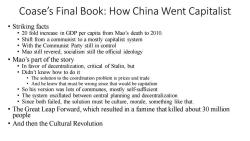
Coase's Final Book:How China Went Capitalist 。Striking facts 20 fold increase in GDP per capita from Mao's death to 2010. Shift from a communist to a mostly capitalist system With the Communist Party still in control Mao still revered,socialism still the official ideology Mao's part of the story In favor of decentralization,critical of Stalin,but Didn't know how to do it The solution to the coordination problem is prices and trade And he knew that must be wrong since that would be capitalism So his version was lots of communes,mostly self-sufficient The system oscillated between central planning and decentralization Since both failed,the solution must be culture,morale,something like that The Great Leap Forward,which resulted in a famine that killed about 30 million people And then the Cultural Revolution
Coase’s Final Book: How China Went Capitalist • Striking facts • 20 fold increase in GDP per capita from Mao’s death to 2010. • Shift from a communist to a mostly capitalist system • With the Communist Party still in control • Mao still revered, socialism still the official ideology • Mao’s part of the story • In favor of decentralization, critical of Stalin, but • Didn’t know how to do it • The solution to the coordination problem is prices and trade • And he knew that must be wrong since that would be capitalism • So his version was lots of communes, mostly self-sufficient • The system oscillated between central planning and decentralization • Since both failed, the solution must be culture, morale, something like that. • The Great Leap Forward, which resulted in a famine that killed about 30 million people • And then the Cultural Revolution
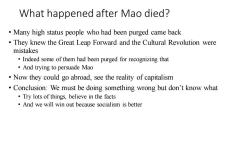
What happened after Mao died? Many high status people who had been purged came back They knew the Great Leap Forward and the Cultural Revolution were mistakes Indeed some of them had been purged for recognizing that And trying to persuade Mao Now they could go abroad,see the reality of capitalism Conclusion:We must be doing something wrong but don't know what Try lots of things,believe in the facts And we will win out because socialism is better
What happened after Mao died? • Many high status people who had been purged came back • They knew the Great Leap Forward and the Cultural Revolution were mistakes • Indeed some of them had been purged for recognizing that • And trying to persuade Mao • Now they could go abroad, see the reality of capitalism • Conclusion: We must be doing something wrong but don’t know what • Try lots of things, believe in the facts • And we will win out because socialism is better
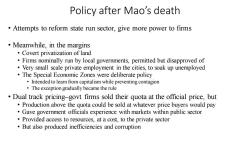
Policy after Mao's death Attempts to reform state run sector,give more power to firms Meanwhile,in the margins Covert privatization of land Firms nominally run by local governments,permitted but disapproved of Very small scale private employment in the cities,to soak up unemployed The Special Economic Zones were deliberate policy Intended to learn from capitalism while preventing contagion The exception gradually became the rule Dual track pricing-govt firms sold their quota at the official price,but Production above the quota could be sold at whatever price buyers would pay Gave government officials experience with markets within public sector Provided access to resources,at a cost,to the private sector But also produced inefficiencies and corruption
Policy after Mao’s death • Attempts to reform state run sector, give more power to firms • Meanwhile, in the margins • Covert privatization of land • Firms nominally run by local governments, permitted but disapproved of • Very small scale private employment in the cities, to soak up unemployed • The Special Economic Zones were deliberate policy • Intended to learn from capitalism while preventing contagion • The exception gradually became the rule • Dual track pricing–govt firms sold their quota at the official price, but • Production above the quota could be sold at whatever price buyers would pay • Gave government officials experience with markets within public sector • Provided access to resources, at a cost, to the private sector • But also produced inefficiencies and corruption
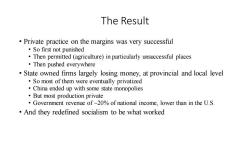
The Result Private practice on the margins was very successful ·So first not punished Then permitted(agriculture)in particularly unsuccessful places Then pushed everywhere State owned firms largely losing money,at provincial and local level So most of them were eventually privatized China ended up with some state monopolies But most production private Government revenue of~20%of national income,lower than in the U.S And they redefined socialism to be what worked
The Result • Private practice on the margins was very successful • So first not punished • Then permitted (agriculture) in particularly unsuccessful places • Then pushed everywhere • State owned firms largely losing money, at provincial and local level • So most of them were eventually privatized • China ended up with some state monopolies • But most production private • Government revenue of ~20% of national income, lower than in the U.S. • And they redefined socialism to be what worked
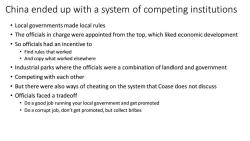
China ended up with a system of competing institutions Local governments made local rules The officials in charge were appointed from the top,which liked economic development So officials had an incentive to Find rules that worked And copy what worked elsewhere Industrial parks where the officials were a combination of landlord and government Competing with each other But there were also ways of cheating on the system that Coase does not discuss Officials faced a tradeoff Do a good job running your local government and get promoted Do a corrupt job,don't get promoted,but collect bribes
China ended up with a system of competing institutions • Local governments made local rules • The officials in charge were appointed from the top, which liked economic development • So officials had an incentive to • Find rules that worked • And copy what worked elsewhere • Industrial parks where the officials were a combination of landlord and government • Competing with each other • But there were also ways of cheating on the system that Coase does not discuss • Officials faced a tradeoff • Do a good job running your local government and get promoted • Do a corrupt job, don’t get promoted, but collect bribes
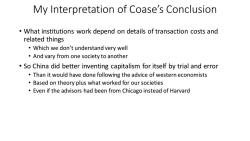
My Interpretation of Coase's Conclusion What institutions work depend on details of transaction costs and related things Which we don't understand very well And vary from one society to another So China did better inventing capitalism for itself by trial and error Than it would have done following the advice of western economists Based on theory plus what worked for our societies Even if the advisors had been from Chicago instead of Harvard
My Interpretation of Coase’s Conclusion • What institutions work depend on details of transaction costs and related things • Which we don’t understand very well • And vary from one society to another • So China did better inventing capitalism for itself by trial and error • Than it would have done following the advice of western economists • Based on theory plus what worked for our societies • Even if the advisors had been from Chicago instead of Harvard
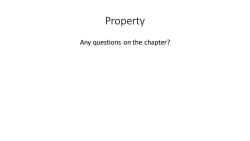
Property Any questions on the chapter?
Property Any questions on the chapter?
按次数下载不扣除下载券;
注册用户24小时内重复下载只扣除一次;
顺序:VIP每日次数-->可用次数-->下载券;
- 《法律经济学》课程PPT教学课件(法律的经济分析)经济学与法律的对话(大卫·弗里德曼)L&E 2 9 Ex Post Ex Ante.pptx
- 《法律经济学》课程PPT教学课件(法律的经济分析)经济学与法律的对话(大卫·弗里德曼)L&E 2 23 Review.pptx
- 《法律经济学》课程PPT教学课件(法律的经济分析)经济学与法律的对话(大卫·弗里德曼)L&E 2 2 The Problem of Social Cost and Risk Aversion is not About Risk -Economics of Insurance.pptx
- 《法律经济学》课程PPT教学课件(法律的经济分析)经济学与法律的对话(大卫·弗里德曼)L&E 2 16 Value of Life.pptx
- 《法律经济学》课程PPT教学课件(法律的经济分析)经济学与法律的对话(大卫·弗里德曼)L&E 2 14 Game Theory.pptx
- 《法律经济学》课程PPT教学课件(法律的经济分析)经济学与法律的对话(大卫·弗里德曼)L&E 1 31 The Problem of Social Cost.pptx
- 《法律经济学》课程PPT教学课件(法律的经济分析)经济学与法律的对话(大卫·弗里德曼)L&E 1 26.pptx
- 《法律经济学》课程PPT教学课件(法律的经济分析)经济学与法律的对话(大卫·弗里德曼)L&E 1 24.pptx
- 《法律经济学》课程PPT教学课件(法律的经济分析)经济学与法律的对话(大卫·弗里德曼)L&E 1 17.pptx
- 上海海洋大学:经管学院2011年版课程教学大纲合集(汇编).pdf
- 吉林大学:《公共部门经济学》课程电子教案(PPT课件)第八章 社会保障.ppt
- 吉林大学:《公共部门经济学》课程电子教案(PPT课件)第九章 地方公共经济.ppt
- 吉林大学:《公共部门经济学》课程电子教案(PPT课件)第五章 公共支出、第六章 公共收入.ppt
- 吉林大学:《公共部门经济学》课程电子教案(PPT课件)第一章到第四章.ppt
- 吉林大学:《公共部门经济学》课程电子教案(PPT课件)第七章 公共分配(负责人:黄立华).ppt
- 吉林大学:《证券投资学》课程电子教案(PPT课件)证券投资学总复习.ppt
- 吉林大学:《证券投资学》课程电子教案(PPT课件)第十三章 证券投资技术分析.ppt
- 吉林大学:《证券投资学》课程电子教案(PPT课件)第十二章 市场分析.ppt
- 吉林大学:《证券投资学》课程电子教案(PPT课件)第十一章 公司分析.ppt
- 吉林大学:《证券投资学》课程电子教案(PPT课件)第十章 证券投资的宏观分析.ppt
- 《法律经济学》课程PPT教学课件(法律的经济分析)经济学与法律的对话(大卫·弗里德曼)L&E 3 16 Intellectual Property.pptx
- 《法律经济学》课程PPT教学课件(法律的经济分析)经济学与法律的对话(大卫·弗里德曼)L&E 3 2 Going over the Midterm plus Coase on China.pptx
- 《法律经济学》课程PPT教学课件(法律的经济分析)经济学与法律的对话(大卫·弗里德曼)L&E 3 21 Contract.pptx
- 《法律经济学》课程PPT教学课件(法律的经济分析)经济学与法律的对话(大卫·弗里德曼)L&E 3 23 Family Law.pptx
- 《法律经济学》课程PPT教学课件(法律的经济分析)经济学与法律的对话(大卫·弗里德曼)L&E 3 28 Tort.pptx
- 《法律经济学》课程PPT教学课件(法律的经济分析)经济学与法律的对话(大卫·弗里德曼)L&E 4 11 Antitrust.pptx
- 《法律经济学》课程PPT教学课件(法律的经济分析)经济学与法律的对话(大卫·弗里德曼)L&E 4 13 Some Very Different Systems.pptx
- 《法律经济学》课程PPT教学课件(法律的经济分析)经济学与法律的对话(大卫·弗里德曼)L&E 4 18 Is the Common Law Efficient.pptx
- 《法律经济学》课程PPT教学课件(法律的经济分析)经济学与法律的对话(大卫·弗里德曼)L&E 4 20.pptx
- 《法律经济学》课程PPT教学课件(法律的经济分析)经济学与法律的对话(大卫·弗里德曼)L&E 4 4 Crime.pptx
- 斯坦福卫生经济学教材(Health Economics)杰伊·巴塔查里亚《健康经济学》课程教学资源(试卷习题,英文版)课后判断题及答案 Ch 10 Adverse Selection in Real Markets.pdf
- 斯坦福卫生经济学教材(Health Economics)杰伊·巴塔查里亚《健康经济学》课程教学资源(试卷习题,英文版)课后判断题及答案 Ch 11 Moral Hazard.pdf
- 斯坦福卫生经济学教材(Health Economics)杰伊·巴塔查里亚《健康经济学》课程教学资源(试卷习题,英文版)课后判断题及答案 Ch 12 Pharmaceuticals and the Economics of Innovation.pdf
- 斯坦福卫生经济学教材(Health Economics)杰伊·巴塔查里亚《健康经济学》课程教学资源(试卷习题,英文版)课后判断题及答案 Ch 13 Technology and the Price of Health Care.pdf
- 斯坦福卫生经济学教材(Health Economics)杰伊·巴塔查里亚《健康经济学》课程教学资源(试卷习题,英文版)课后判断题及答案 Ch 14 Health Technology Assessment.pdf
- 斯坦福卫生经济学教材(Health Economics)杰伊·巴塔查里亚《健康经济学》课程教学资源(试卷习题,英文版)课后判断题及答案 Ch 15 The Health Policy Conundrum.pdf
- 斯坦福卫生经济学教材(Health Economics)杰伊·巴塔查里亚《健康经济学》课程教学资源(试卷习题,英文版)课后判断题及答案 Ch 16 The Beveridge Model - Nationalized Health Care.pdf
- 斯坦福卫生经济学教材(Health Economics)杰伊·巴塔查里亚《健康经济学》课程教学资源(试卷习题,英文版)课后判断题及答案 Ch 17 The Bismarck Model - Social Health Insurance.pdf
- 斯坦福卫生经济学教材(Health Economics)杰伊·巴塔查里亚《健康经济学》课程教学资源(试卷习题,英文版)课后判断题及答案 Ch 18 The American Model.pdf
- 斯坦福卫生经济学教材(Health Economics)杰伊·巴塔查里亚《健康经济学》课程教学资源(试卷习题,英文版)课后判断题及答案 Ch 19 Population Aging and the Future of Health Policy.pdf
